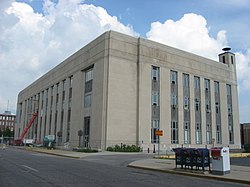This article includes a list of general references, but it lacks sufficient corresponding inline citations .(October 2022) |
The following buildings are examples of the Art Deco architectural style in Indiana, United States.
Contents
- Evansville
- Fort Wayne
- Indianapolis
- New Haven
- Shelbyville
- South Bend
- Terre Haute
- Versailles
- Other sites
- See also
- References
- External links





